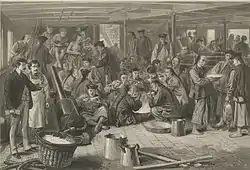Narcotic Drugs Import and Export Act
The Narcotic Drugs Import and Export Act was a 1922[1] act of the 67th United States Congress. Sponsored by Sen. Wesley L. Jones (R) of Washington and Rep. John F. Miller (R) of Washington. It is also often referred to as the Jones-Miller Act.[2]
.svg.png.webp) | |
| Other short titles | Jones-Miller Act |
|---|---|
| Long title | An Act to amend the Act entitled "An Act to prohibit the importation and use of opium for other than medicinal purposes," approved February 9, 1909, as amended. |
| Acronyms (colloquial) | NDIEA |
| Nicknames | Narcotic Drugs Import and Export Act Amendment |
| Enacted by | the 67th United States Congress |
| Effective | May 26, 1922 |
| Citations | |
| Public law | Pub.L. 67–227 |
| Statutes at Large | 42 Stat. 596 |
| Codification | |
| Acts amended | Smoking Opium Exclusion Act of 1909 |
| Titles amended | 21 U.S.C.: Food and Drugs |
| U.S.C. sections created | 21 U.S.C. ch. 6 § 171 et seq. |
| Legislative history | |
| |
Federal Narcotics Control Board
The Act also led to the establishing of the Federal Narcotics Control Board (FNCB) to tightly oversee the import and export primarily of opiates, but also other psychoactive drugs like coca. The control board were created to better control what America was exporting from its territories to others as well as what was being brought in, to ban all recreational consumption and to control the quality of what was being used for medical purposes.[3]
Background

The newly brought in act was but another in a long line from 1848 that set out to curtail the use of drugs for recreational purposes, most of which started from San Francisco area with the attempt to curtail opium smoking, first by banning the smoking in public, exempting opium dens,[4] until finally going for an all out ban, nationwide in 1922. Before the Jones-Miller Act laws were passed on a state by state basis.
Opium Importation Prohibition of 1909
60th United States Congress passed House bill H.R. 27427, better known as the Smoking Opium Exclusion Act of 1909, which U.S. President Theodore Roosevelt enacted into law on February 9, 1909.[5] Public Law 60-221 was effective after the first day of April 1909 imposing an unlawful Act to import any derivative, any form, or preparation of opium into the United States. The statutory law authorizes the importation of the psychoactive drug provided any opium derivatives and preparations will be for medicinal purposes only.
Amendments to 1922 Act
U.S. Congressional amendments to the Narcotic Drugs Import and Export Act, and for other purposes.
| Date of Enactment | Public Law Number | U.S. Statute Citation | U.S. Legislative Bill | U.S. Presidential Administration |
|---|---|---|---|---|
| December 11, 1942 | P.L. 77-797 | 56 Stat. 1045 | H.R. 7568 | Franklin D. Roosevelt |
| July 1, 1944 | P.L. 78-400 | 58 Stat. 674 | H.J.Res. 241 | Franklin D. Roosevelt |
| July 1, 1944 | P.L. 78-414 | 58 Stat. 721 | H.R. 4881 | Franklin D. Roosevelt |
| August 8, 1953 | P.L. 83-240 | 67 Stat. 505 | H.R. 5561 | Dwight D. Eisenhower |
| July 18, 1956 | P.L. 84-728 | 70 Stat. 567 | H.R. 11619 | Dwight D. Eisenhower |
| June 21, 1966 | P.L. 89-464 | 80 Stat. 213 | H.R. 13733 | Lyndon B. Johnson |
| December 28, 1973 | P.L. 93-218 | 87 Stat. 912 | S. 2166 | Richard M. Nixon |

See also
References
- "Narcotic Drug Import and Export Act Law & Legal Definition". definitions.uslegal.com. Retrieved 9 November 2012.
- Erowid, Fire. "U.S. Drug Control Timeline". www.erowid.org. Retrieved 9 November 2012.
- "Drugs, The Law, and The Future". www.umsl.edu. Retrieved 9 November 2012.
- "Learn about the laws concerning opioids from the 1800s until today". www.naabt.org. Retrieved 9 November 2012.
- "Smoking Opium Exclusion Act of 1909 - P.L. 60-221". 35 Stat. 614 ~ House Bill 27427. USLAW.Link.
External links
- "Narcotic Drugs Control - Public Resolution 67-96" (PDF). 42 Stat. 1431 ~ House Joint Resolution 453. USLAW.Link. March 2, 1923.